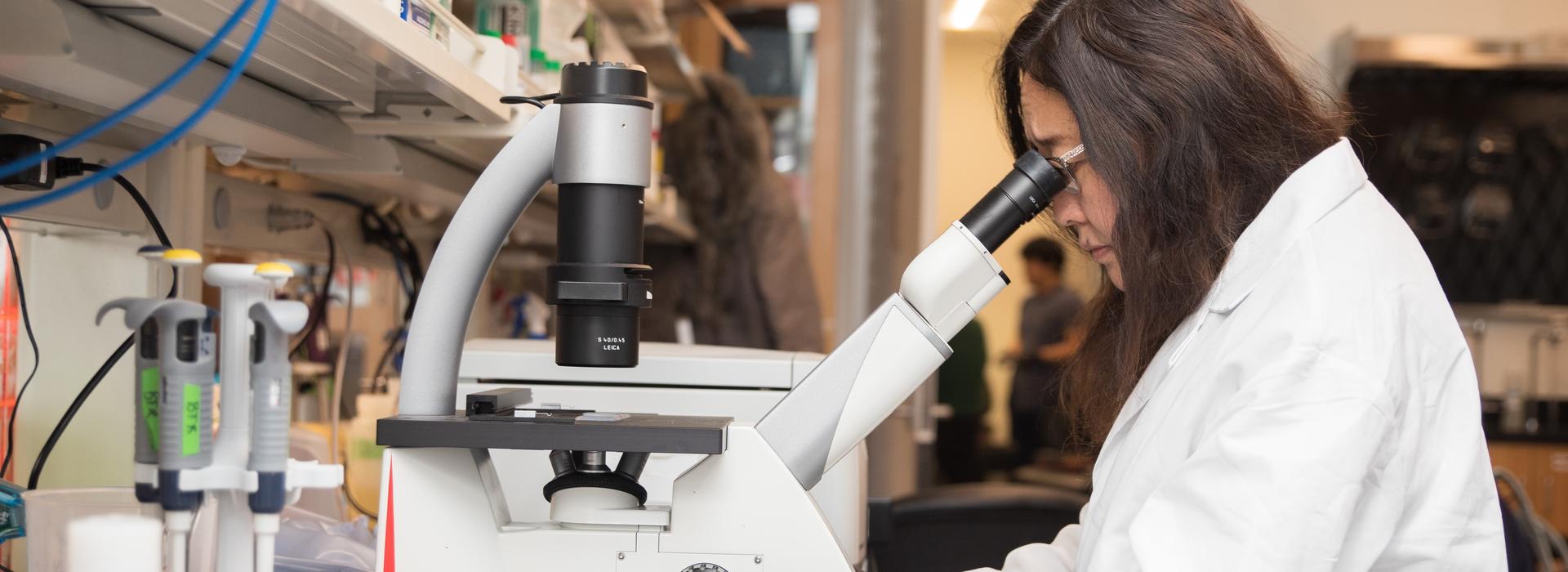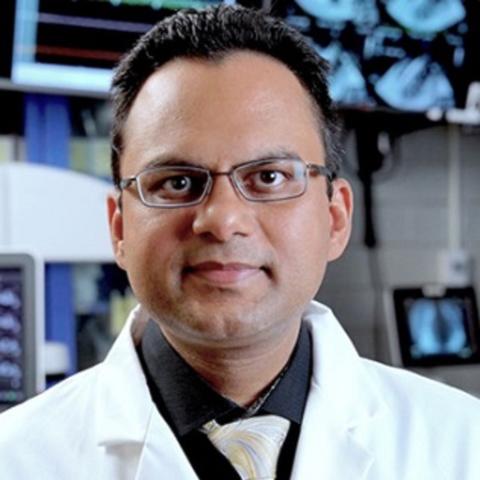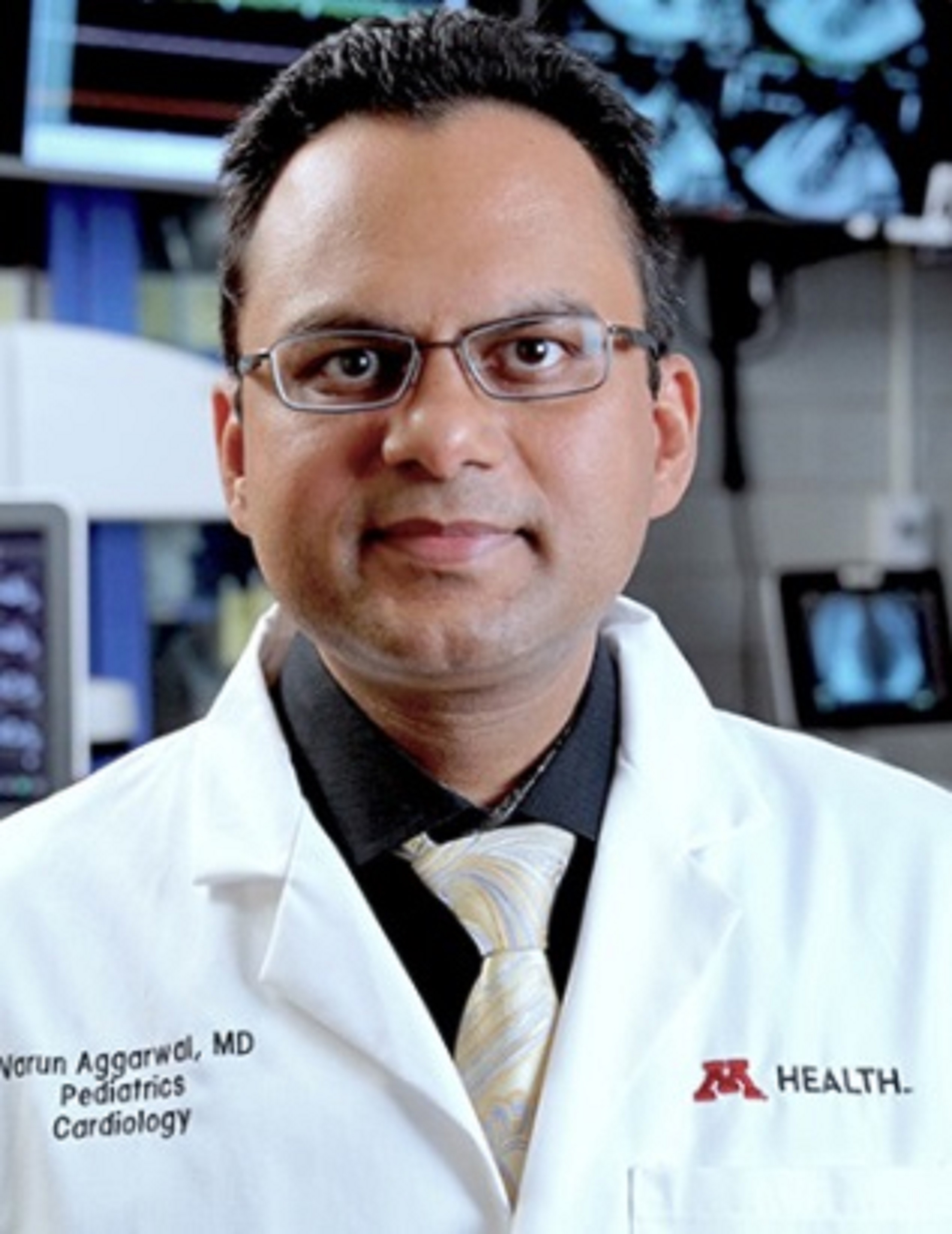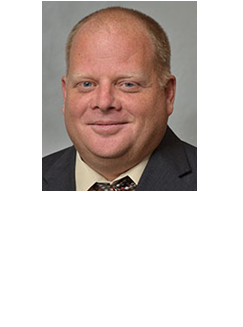
Research Council
The Pediatrics Research Council contributes to the mission of the department by providing guidance to the Vice Chair for Research, managing intramural and bridge research funding, being involved in new faculty hires, and assisting with identifying research mentors. The PRC plays an essential role in departmental affairs relating to research.
Research Council Members


Bio
Varun Aggarwal is a compassionate physician, researcher, and educator dedicated to transforming the landscape of congenital cardiovascular care for children and adults. As an Associate Professor at the University of Minnesota Medical School, Dr. Aggarwal brings a fervent commitment to improving the lives of individuals with congenital heart disease.
At the heart of his practice is a pioneering focus on minimally invasive transcatheter treatment options tailored specifically for those with congenital heart conditions. Dr. Aggarwal specializes in cutting-edge techniques that offer hope and healing to patients facing complex cardiac challenges from birth. His approach emphasizes precision and effectiveness, while minimizing the impact on delicate bodies, ensuring a brighter, healthier future for his patients.
Beyond the clinic, Dr. Aggarwal is a driving force in cardiovascular research, relentlessly pursuing advancements in congenital cardiac interventions. His work has been instrumental in refining minimally invasive therapies, pushing boundaries to deliver groundbreaking solutions that enhance the quality of life for individuals and their families. Dr. Aggarwal has more than 70 peer reviewed publications and has earned various awards at national and international level for his research.
Dr. Aggarwal's dedication extends to education, where he mentors the next generation of healthcare providers, instilling in them the values of empathy, innovation, and excellence. Through his leadership and collaboration, he empowers others to join the mission of revolutionizing congenital cardiovascular care.
Dr. Aggarwal also serves as the President and Editor-in-chief for The Congenital heart International Professionals (CHiP) Network (thechipnetwork.org), is the founding fellow of the Pediatric and congenital Interventional Cardiovascular Society (PICS). He serves on the editorial board of the Journal of Society of Cardiovascular Angiography and Interventions (JSCAI), Indian Pediatrics-Case reports, Frontiers in Nutrition, American Academy of Pediatrics PREP cardiology,
With boundless compassion and unwavering determination, Dr. Varun Aggarwal embodies the hope and healing that defines the future of congenital heart disease.
Education
Fellowships, Residencies, and Visiting Engagements
Licensures and Certifications
Honors and Recognition
Contact
Address
Pediatric CardiologyAcademic Office Building
2450 Riverside Ave S AO-401
Minneapolis, MN 55454


Bio
Dr. Bellin completed her pediatric residency and pediatric endocrine fellowship training at the University of Minnesota, and joined the faculty in 2009, with a joint appointment in Pediatrics and Surgery. Dr. Bellin's research focus is islet transplantation (transplantation of the insulin producing cells of the pancreas) for patients with type 1 diabetes mellitus and for patients who have their pancreas removed to treat severe chronic pancreatitis. She provides care for children with diabetes or general endocrine disorders at M Health Maple Grove Clinic and for islet transplant recipients at the University site.
Research Summary
Total Pancreatectomy Islet Auto Transplant, Chronic Pancreatitis
Clinical Summary
Chronic Pancreatitis, TPIAT, T1DM, General Endocrine
Education
Fellowships, Residencies, and Visiting Engagements
Licensures and Certifications
Honors and Recognition
Contact
Address
Pediatric EndocrinologyAcademic Office Building
2450 Riverside Ave S AO-201
Minneapolis, MN 55454

Bio
Sarah E. Cusick, PhD, is Assistant Professor of pediatrics in the School of Medicine, a member of the public health nutrition faculty in the School of Public Health, a faculty member of the Center for Neurobehavioral Development, and a member of the University's Nutrition and Epidemiology graduate faculties. She holds a Ph.D. in Nutrition and International Health from the Johns Hopkins Bloomberg School of Public Health and completed a postdoctoral fellowship at the U.S. Centers for Disease Control and Prevention. Her research, based in Uganda, aims to elucidate iron deficiency and infectious disease interactions, with a goal of improving the neurobehavioral development of children living in resource-poor settings. She leads an NIH-funded clinical trial that aims to identify the optimal timing of iron therapy in iron-deficient children with malaria and a study to determine the role of iron deficiency in the neurodevelopment of children exposed to HIV.
Research Summary
Research Interests
Dr. Cusick's research focuses on international maternal and child nutrition, the interaction between nutritional deficiencies and infectious disease, and the effect of these interactions on child health and long-term cognitive development.
Research Projects
Currently funded research include several NIH-funded studies: one on the effect of acute vs. delayed iron therapy in severe malaria on anemia, iron status, and neurobehavioral development in Ugandan children (PI: Chandy John, M.D.) and an investigation of red blood cell iron incorporation in severe malaria.
Education
Fellowships, Residencies, and Visiting Engagements
Honors and Recognition
Contact
Address
Pediatric Epidemiology & Clinical ResearchMayo Mail Code 715
420 Delaware St SE
Minneapolis, MN 55455

Bio
Dr. Eisenberg is a Professor in Pediatrics in the Division of General Pediatrics and Adolescent Health. She received her baccalaureate degree from the University of Wisconsin and her Master of Public Health from the University of Minnesota, School of Public Health. Dr. Eisenberg earned her Doctor of Science degree from Harvard University School of Public Health and completed a post-doctoral fellowship in Adolescent Health at the University of Minnesota.
Research Summary
Dr. Eisenberg focuses her research on social influences on health, behavior, and well-being among adolescents and young adults, and disseminates findings for real-world application. She is particularly interested in interpersonal, organizational, and structural forces that shape the experience of LGBTQ+ youth, including those with intersecting marginalized social positions. Learn more about Dr. Eisenberg's research on the Experts profile and at HealthEASY.
Education
Fellowships, Residencies, and Visiting Engagements
Honors and Recognition
Contact
Address
General Pediatrics & Adolescent Health717 Delaware St SE, 3rd floor
Minneapolis, MN 55414


Bio
Dr. Fischer is a pediatric critical care physician and Associate Professor at the University of Minnesota. She is an alumna of Vassar College, completed her pediatric residency at Dartmouth-Hitchcock Hospital Center, and her pediatric critical care fellowship at the University of Minnesota. Dr. Fischer's non-clinical focus is on pediatric medical devices and drug therapies. She is an alumna of the UMN Medical Device Center Innovation Fellows Program and is the founder and Director of the Pediatric Device Innovation Consortium (PDIC), which seeks to move pediatric technologies forward towards commercialization. Dr. Fischer also serves as Respiratory Care Director and ECMO Director for UMN Masonic Children's Hospital, as well as Associate Chair for Research Partnerships within the Pediatrics Department.
Her research interests include pediatric and adult medical device and drug development and clinical trials, ECMO, critical care, and regulation of medical devices.
Clinical Summary
Pediatric Critical Care; Pediatric Medical Device Technology
Education
Fellowships, Residencies, and Visiting Engagements
Licensures and Certifications
Honors and Recognition
Contact
Address
Pediatric Critical Care MedicineAcademic Office Building
2450 Riverside Ave S AO-301
Minneapolis, MN 55454
Administrative Contact
Joanna Perrier
Administrative Phone: 612-625-6678
Administrative Email: jperrier@umn.edu


Bio
Michael K. Georgieff, MD, holds the position of the Martin Lenz Harrison Land Grant Chair in Pediatrics. He is a Professor of Pediatrics, Obstetrics and Gynecology, and Developmental Psychology, the Executive Vice Chair of the Department of Pediatrics, and the Director of the Center for Neurobehavioral Development. He received his MD from Washington University in St. Louis, Missouri. He served his internship, residency and neonatal fellowship at the Children's Hospital of Philadelphia and a fellowship in neonatology at the University of Minnesota. In addition to caring for patients on the Neonatal Intensive Care Unit, Dr. Georgieff is Director of the NICU Follow-up Program. Dr. Georgieff's research focuses on fetal/neonatal nutrition and brain development, specifically on the effect of early life iron nutrition and neurocognitive function. He has been continuously funded in this field by the National Institutes of Health for 35 years and has published over 300 scientific articles. He advises the American Academy of Pediatrics, the National Institutes of Health and UNICEF on nutrition and early child development.
Clinical Summary
Iron and infant development; Maternal-fetal medicine; Neonatology; Perinatal iron metabolism
Education
Fellowships, Residencies, and Visiting Engagements
Licensures and Certifications
Honors and Recognition
Professional Memberships
Contact
Address
Pediatric NeonatologyAcademic Office Building
2450 Riverside Ave S AO-401
Minneapolis, MN 55454


Bio
Alicia Kunin-Batson, PhD, LP is an Associate Professor and licensed psychologist in the Department of Pediatrics at the University of Minnesota Medical School. She received her doctoral degree from Rosalind Franklin University of Medicine & Science (Finch University of Health Sciences/The Chicago Medical School) and completed internship and postdoctoral training in pediatric psychology at the Children’s Hospital of Philadelphia. She subsequently completed a 2-year postdoctoral fellowship in pediatric neuropsychology at the University of Minnesota, Department of Pediatrics. Her research program focuses on neurocognitive and psychosocial influences on health and health behaviors, and the biological and behavioral mechanisms linking early stressful life experiences to future health risks. She has served as PI or co-I on NIH grants (NIDDK, NICHD, NHLBI, NCI NCCIH). Her clinical interests include neuropsychological evaluations of children with chronic health conditions, specifically brain tumor, pediatric solid tumors, hematologic malignancies, and anemias. She is co-chair of the Neuropsychological and Psychosocial Complications, Late Effects Guidelines Taskforce of the Children’s Oncology Group. She is the Associate Director of Research within the Division of Clinical Behavioral Neurosciences and Section Head of the Pediatric Neuropsychology Program.
Clinical Summary
Dr. Kunin-Batson is involved in the following clinics:
- Outpatient pediatric neuropsychology clinic, Masonic Institute for the Developing Brain
- Leukemia & Lymphoma Comprehensive Consultative Clinic
Education
Fellowships, Residencies, and Visiting Engagements
Honors and Recognition
Contact
Address
Clinical Behavioral Neuroscience2025 E. River Parkway
7962A
Minneapolis, MN 55414


Bio
Dr. Olin is Associate Professor in the Department of Pediatrics, Division of Hematology/Oncology.
Dr. Olin graduated from the University of Minnesota, Duluth, in 1995 with a BS in biochemistry and a BA in chemistry. After graduating, he worked in industry for 5 years before returning to the U of M to complete his PhD in Veterinary Medicine (Infectious Disease) in 2005. From 2006-2008 Dr. Olin did a postdoctoral fellowship with Dr. Philip Peterson studying the effects of opioids on tuberculosis meningitis, and from 2008-2011 he did a second post doctoral fellowship with Dr. John Ohlfest in brain tumor immunotherapy. Dr. Olin joined the Department of Pediatrics Faculty as an Assistant Professor in 2011.
Research Summary
Dr. Olin's scientific interest is defining the mechanism(s) of suppression inhibiting the ability to mount a tumoricidal response evident in the tumor draining lymph nodes and tumor environment and developed potential ways to modulate the immunosuppressive activity. Immunosuppressive tumor environment is a major hurdle for the immune system to overcome. Dr. Olin is focused on the development of inhibitors derived to overcome the suppressive tumor microenvironment.
Education
Fellowships, Residencies, and Visiting Engagements
Honors and Recognition
Contact
Address
Pediatric Hematology-OncologyMayo Mail Code 484
420 Delaware Street SE
Minneapolis, MN 55455
Administrative Contact
Abby Wenninger, MPH
Administrative Associate, Division of Pediatric Hematology/Oncology
University of Minnesota Medical School - Twin Cities
Email: wenni021@umn.edu | Office: Mayo A547
Administrative Fax Number: 612-624-3913


Clinical Summary
Clinical research; Neurodevelopmental outcomes; Nutrition, growth, and body composition
Education
Fellowships, Residencies, and Visiting Engagements
Licensures and Certifications
Honors and Recognition
Contact
Address
Pediatric NeonatologyAcademic Office Building
2450 Riverside Ave S AO-401
Minneapolis, MN 55454


Bio
Dr. Steiner is a Professor of Pediatrics in the Division of Hematology/Oncology as well as the Division of Critical Care. She attends on the Pediatric Intensive Care Unit and conducts Pediatric Hematology and Hemostasis clinics at the M Health Fairview Masonic Children's Hospital Journey Clinic.
Dr. Steiner received her MS degree in Genetics at the University of Minnesota in 1978 before earning her MD there in 1982. She remained at the University of Minnesota, completing her internship and residency in Pediatrics in 1985 and then both Hematology-Oncology and Critical Care post-doctoral fellowships in 1989. She moved to West Virginia University in 1990. At WVU, she started a pediatric bone marrow transplant program. She also served as pediatric critical chair division chair and PICU director, and started a PICU fellowship. She returned to the University of Minnesota in 1997, and has been the PICU Fellowship Director here since 2007.
Dr. Steiner's academic appointment is in the Clinical Scholar Academic track. She is an advisor to multiple medical students, residents, and fellows and has mentored several in their clinical research projects.
She serves on several additional hospital committees, including the University of Minnesota Infection Control, Pediatric Infection Control, and Transfusion (co-chair).
Dr. Steiner's clinical research is focused on hemostasis and transfusion practice in critically ill children. Dr. Steiner has participated in the publication of over 50 articles, teaching manuals, and book chapters. She is a member of several professional societies, including American Society of Hematology, International Society of Thrombosis and Hemostasis, and Society of Critical Care Medicine. She also holds leadership positions in the Pediatric Acute Lung Injury and Sepsis Investigators.
Research Summary
Coagulopathology of Critical Illness; Use of rFVIIa in Non-Hemophiliac Populations; Hemostasis in Congenital Cardiac Surgery Patients; Hemostasis Management of Extracorporeal Circuits; Transfusion Practice in Critically Ill Children
Clinical Summary
Bleeding and clotting disorders; Critical care for oncology and blood and marrow transplant; Hemostasis management of extracorporeal circuits; Transfusion practice
Education
Fellowships, Residencies, and Visiting Engagements
Licensures and Certifications
Honors and Recognition
Contact
Address
Pediatric Hematology-OncologyMayo Mail Code 484
420 Delaware Street SE
Minneapolis, MN 55455
Administrative Contact
Elizabeth Hendrickson Nalli
Administrative Phone: 612-626-5501
Administrative Email: hend1075@umn.edu


Bio
Phu Tran is an Associate Professor in the Department of Pediatrics. His research focuses on mechanisms (molecular and epigenetic) underlying the long-term effects of early-life adversity on neural development. His lab has been investigating how early-life (fetal and early postnatal) environmental exposures (nutritional deficiency, opioids) result in long-term neural gene dysregulation associated with altered epigenetic signatures. His lab employs cutting-edge technology (ATACseq/ChIPseq/Single-cell sequencing/exosomes) to probe these changes in cord blood stem cells and rodent hippocampal cells with an ultimate goal to establish non-invasive biomarkers for brain development and health. His other research interests include molecular mechanisms regulating post-operative pain, neonatal hypoxic-ischemic brain injury, and nicotinic acetylcholine receptor chaperones.
Research Summary
Our research activities focus on two major goals. First, we investigate the long-term effects of early-life iron deficiency on hippocampal function. Iron deficiency is a major global health concern that affects conservatively 2 billion individuals worldwide, including about 30% of pregnant women and pre-school age children.It is well established that early-life iron deficiency has long lasting negative effects on cognition and socio-emotional behaviors in humans despite prompt iron treatment following diagnosis.These long-term effects constitute a significant cost to society in terms of educational attainment, job potential, and mental health.Thus, understanding at the cellular and molecular level how early iron deficiency affects brain development in animal models may lead to important insights into alternative therapeutic development to prevent and treat at risk pregnancies and children with iron deficiency. Second, we investigate the biological role of TMEM35A (NACHO) in the nervous system. TMEM35A has been shown to function as a chaperone for neuronal nicotinic acetylcholine receptors, which have been implicated in neuropathologies and psychopathologies (e.g., addiction, pain, Autism, Alzheimer, and schizophrenia). Defining the precise molecular function of this novel chaperone using a gene knockout mouse model and drug treatment is promising in defining new mechanisms and pathways that regulate cognition, pain, and addictive behaviors.The work may lead to new strategies to improving quality of life and productivity.
Education
Fellowships, Residencies, and Visiting Engagements
Honors and Recognition
Contact
Address
Pediatric NeonatologyAcademic Office Building
2450 Riverside Ave S AO-401
Minneapolis, MN 55454

Bio
Dr. Beau Webber is an Associate Professor in the Department of Pediatrics, Division of Hematology and Oncology at the University of Minnesota. He graduated from the University of Wisconsin- LaCrosse in 2007 with a BS in Cellular and Molecular Biology and conducted his PhD studies at the University of Minnesota where he studied the embryonic development of hematopoietic stem cells. As a postdoctoral fellow in the Hematology, Oncology, and Transplantation program at the University of Minnesota, Dr. Webber developed advanced strategies for genetic modification of human lymphohematopoietic and pluripotent stem cells for cancer immunotherapy and correction of inherited diseases. Dr. Webber joined the Department of Pediatrics Faculty as an Assistant Professor in 2017.
Research Summary
Dr. Webber's laboratory is focused on synergizing genome engineering, stem cell biology, and adoptive cellular therapy to develop novel treatments for genetic disease and cancer. Research projects in the lab currently fall into two broad areas: the application of genome engineering to develop improved cell-based immune and gene therapies, and the development of "bottom-up" cancer models using human pluripotent stem cells.
Education
Fellowships, Residencies, and Visiting Engagements
Honors and Recognition
Contact
Address
Pediatric Hematology-OncologyMayo Mail Code 484
420 Delaware Street SE
Minneapolis, MN 55455
Administrative Contact
Abby Wenninger, MPH
Administrative Associate, Division of Pediatric Hematology/Oncology
University of Minnesota Medical School - Twin Cities
Email: wenni021@umn.edu | Office: Mayo A547
Administrative Fax Number: 612-624-3913
Research Council Staff
Erinn Barclay
Finance Manager
elodell@umn.edu
Suzanne Blodgett
Finance Professional
timmx166@umn.edu
Joy Bremer
Finance Analyst
breme009@umn.edu
Jennifer Goldfarb
Clinical Research Program Director, Children's Health
goldf092@umn.edu
Lori Wallin
Director, Research Support Services
l-wall@umn.edu
If you have equipment that you no longer need and would like to offer it to other labs. Please email pedsigp@umn edu with the following information:
- Name and Model Number of Equipment
- Picture of Equipment
- Location
- Notes of working condition, availability of manuals
Questions, comments or concerns with research administration, strategy, or anything else research related? Contact pedsigp@umn.edu.



